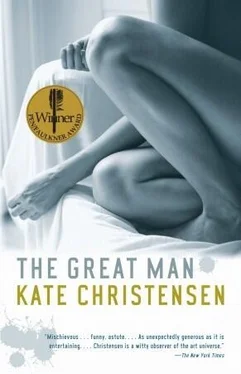“That’s for sure,” said Ralph, chuckling. He had cut off his devil’s horn dreadlocks and now sported a close Afro, a neat cap of hair. “It was an honor to get to know all these women in his life. I have become especially close to his widow, Abigail.”
Henry stared at him. “When I started out,” he said with a tinge of bitterness, “I thought Oscar was the most enviable man in human history. I thought he was the guy who had it all.” He took a gingerly sip of wine. He was drinking it to help himself relax, but every acidic sip brought him closer to vomiting, so it was a careful balancing act. “Now, after talking to all the people who knew him best, I see him very differently. I see him as a very lonely man. Very isolated among all these devoted women. I learned a lot from my research, you could say.”
“I’m sorry to hear that,” said Ralph with preacherly consolation. His lips gleamed redly with the wine. “I had the opposite experience. I discovered how truly lucky Oscar was, how blessed. I had originally thought of him as a sort of outsider, isolated, as you say, by his own self-imposed limitations. Now I see that he created his own inside. He was always true to himself.”
Henry stared at him again, formulating a question. “I wonder,” he said after a moment, “what you make of his two households. It strikes me that he needed to have a toehold in both places to avoid real intimacy.”
Ralph laughed, throwing his head back. Henry blinked, surprised at the force of the other man’s amusement. “Oh ho ho,” Ralph said, laughing. “Oscar would think it was funny to hear you say that.”
“Maybe,” said Henry. He scratched his chin. “I’m sure he would.”
“What would Maxine make of all this hoopla if she were alive to see it?” Ralph asked, looking around. The Metropolitan Museum of Art had loaned Helena to the gallery. Out of gratitude, Michael Rubinstein had offered in return to host, instead of the usual free opening for all the riffraff in street clothes, an invitation-only black-tie party to raise money for the museum. “They called her a feminist art pioneer in the Voice yesterday.”
“Maxine would have choked on her own tongue before she would have had anything to do with the word feminist, ” said Henry. “She said she thought feminism was boring and didactic.”
Ralph looked up at the portrait of Paula. “Do you think these are as good as Oscar’s portraits, the way a lot of people are saying?”
Henry peered first at one portrait and then the other, as if he had never thought much about the question before and was considering it for the first time. Maybe it was just his mood, but the painting of the younger Jane Fleming seemed just slightly self-conscious, and the new one, of Paula Jabar, seemed a little unbalanced, overly vivid. He contrasted them in his memory’s eye to Mercy, which he recalled was jazzy without being garish, joyful and full of life.
“No,” said Henry. “Frankly, I think Mercy is by far the best of the three. Do you think these are as good?”
“I’m afraid I do,” said Ralph. “I wish I didn’t. I feel disloyal to Oscar.”
“Maybe I’m seeing them differently, knowing they’re imitations of Oscar by Maxine and not really genuinely her own artistic vision,” said Henry.
“Could be,” said Ralph. “Knowing that changed everything for me. I tried not to let it.”
Just then, a group of five women entered from the street, coming in at the far end of the gallery, chattering, patting and smoothing their hair to repair the ravages of the windy evening outside: Teddy and her two daughters, her friend Lila, and Oscar’s widow, Abigail, dressed in evening gowns, all in striking colors. They appeared to be laughing together at something Teddy was saying.
Henry’s heart constricted at the sight of Ruby. Where was Melanie? Ruby was wearing a strapless green dress and had her hair piled on top of her head. She looked breathtakingly glamorous; Henry couldn’t imagine how he had managed to win her, assuming she could ever be won. He had fallen madly, adolescently in love with her, and now felt that he couldn’t live without her. This had not been part of his plan. He had only meant to follow Teddy’s advice to have an innocent but passionate affair of the heart so his wife would sleep with him again. He had never meant for it to get so out of hand. He wished Melanie would magically vanish off the face of the earth so he could marry Ruby. He would never have either the nerve or the heartlessness to leave Melanie; for the sake of his son, he would have to give Ruby up before Melanie found out about the whole thing and his life exploded. But the thought of going on for the rest of his life without Ruby, now that he knew what it was like to be with her, felt like being locked in a stone tower with no windows. But if Melanie found out…He swallowed hard to tamp down a rising tide of nausea.
“What’s Abigail doing with Teddy and her little coterie?” he asked.
“Oh, they’re all very friendly with one another now,” said Ralph.
“Why?”
“Why not?” said Ralph. “No reason not to be, anymore.”
Surrounding the group of five women, escorting one or more of them apiece, were three men. Henry recognized Samantha’s tall, gangly, exceedingly dorky husband, Ivan Sandusky, with his thatch of white hair and potbelly, and he had a feeling the bald, slender old man was Teddy’s old friend and new beau; she had mentioned him the week before when they’d talked on the telephone. But he had no idea who the slouching young man was, his hand hovering near Ruby’s elbow, his hair unnecessarily copious. All Henry knew was that he didn’t like the way Ruby leaned her shoulder against that boy’s so intimately. The idea that she might have other lovers besides himself had never occurred to Henry before, and now that it had, he found himself violently jealous, on top of all the other terrible things he was already feeling.
The deejay suddenly got his act together; music leapt from the speakers. After a moment, Henry recognized Stravinsky’s Rite of Spring.
Michael Rubinstein came bustling through the hall. Behind him scuttled an officious-looking, glamorous young black woman.
“Hello,” he said to the two biographers, and dove into the gathering crowd.
“Get something to drink if you like,” said the assistant just before she vanished behind her employer.
“We are drinking,” said Henry to Ralph.
Ralph nodded at Henry. “I’ve been looking forward to this evening,” he said. “I imagine you have, too.”
“Oh, God no,” said Henry.
“Why not?”
Henry looked at Ralph. “I barely know you,” he said. “But I have no one else to tell this to. I’m having an affair with Oscar’s daughter Ruby. My wife is here tonight, too; wild horses and five armies couldn’t have kept her away. They’re both here. We couldn’t get a baby-sitter for Maxine’s memorial service, so she stayed home that day; I was hoping the same thing would happen tonight, but no such luck. I’m terrified one of them will make a scene. My wife will smell it out the minute she sees Ruby and me together; she’ll just know. And Ruby won’t back down if Melanie comes at her; she has no sentimental ideals about the sanctity of marriage. She thinks it’s absurd for people to be one another’s property or to impose the unnatural restrictions of monogamy on human nature.”
Ralph looked at Henry with dawning empathy. Then he burst out laughing.
“What’s so funny?” Henry asked.
“Oscar would love that,” said Ralph. “He would love it! Relax, man. They’re not going to make a scene, not here. Just enjoy yourself. Ruby? Well done. She’s a lovely girl. She doesn’t seem the type to be confrontational or dramatic. You should just enjoy yourself.”
Читать дальше












